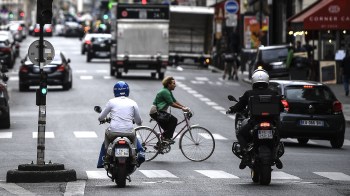Traffic and corruption in New Delhi
TEXT OF STORY
Doug Krizner: The rapid growth of India’s economy has had one unintended consequence: the poorest road safety record on the planet. Eight percent of the world’s total traffic-related deaths occur in India. In New Delhi, the High Court increased fines to discourage bad driving. But, as Miranda Kennedy reports, it may not have the intended effect.
Miranda Kennedy: What would pass as a near collision or potential pileup on U.S. roads is just normal traffic here. It wouldn’t really warrant police action.
But something surprising is now happening around evening rush hour. Several cops are carefully scanning the traffic and they pull someone over.
Cop: Oh yeah, yeah, you are without helmet. Yes, both are without helmet.
The High Court recently decided that the roads of the capital were just too crazy. It cracked down on the police, who are notorious for taking bribes instead of giving out tickets. So the court raised the fines for traffic violators.
A policeman pulls over two guys on a motorcycle without helmets. Looks like a slam dunk for a fine. Then things get juicier.
Cop: Please stop it, stop it. You are both without helmet.
Kennedy: Do you have a license?
Driver: I don’t have anything, nothing at all.
Kennedy: So you never use a license or a helmet?
The driver says he’s just visiting from Sudan, and the policeman waves him away without a fine. Sikhs wearing turbans and women also get a pass.
Cop: OK, go.
Under the new law, the maximum fine has jumped from $20 to $30. The real question is whether the higher fees will go to the government or into the policemen’s pockets to cover “business expenses.”
Swati Mehta: They won’t really fine you, but take half the money as bribe.
Swati Mehta works for a non profit that’s trying to reform India’s police. She says cops often have to pay a bribe of $10,000 or $20,000 just to get into the force. They earn a pittance, but figure they can make it back later by demanding bribes.
Mehta: With policing you always have to rely on individuals, standing on the road, there’s no supervisor to keep an eye on him or her. A huge overhauling of the system is required. It is what we’re working on, it just seems so daunting a task.
It’s pretty hard to catch corrupt cops when the people you report police corruption to, are the police themselves.
In New Delhi, I’m Miranda Kennedy for Marketplace.
There’s a lot happening in the world. Through it all, Marketplace is here for you.
You rely on Marketplace to break down the world’s events and tell you how it affects you in a fact-based, approachable way. We rely on your financial support to keep making that possible.
Your donation today powers the independent journalism that you rely on. For just $5/month, you can help sustain Marketplace so we can keep reporting on the things that matter to you.


















